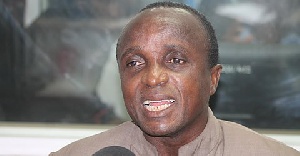A senior officer at the Ministry of Finance and Economic Planning, yesterday, gave testimony at the Ghana Youth Employment and Entrepreneurial Development Agency (GYEEDA) trial and made interesting revelations.
Gladys Ghartey, current Head of United Nations Systems at the ministry, told the Accra Financial Court that as at the time she was leaving the desk responsible for the GYEEDA programme, the $65 million World Bank money that was to help create jobs for the youth had not even been determined, let alone secured.
“I came to know the NYEP, now GYEEDA programme, in October 2010 and left the desk in April 2013,” she claimed adding that as at the time she was leaving, there was no indication that the money was coming within the shortest time possible, since securing funds from the World Bank required a very complex procedure, the second prosecution witness told the court presided over by Justice Afia Asare-Botwe.
Incumbent Member of Parliament (MP) for Chiana-Paga, Abuga Pele and Philip Akpeena Assibit, Chief Executive Officer of Goodwill International Group (GIG), are standing trial for their various roles which the Attorney General’s Department says had cost huge financial loss to the State.
Until last year, Abuga Pele was the National Coordinator of the National Youth Employment Programme (NYEP), now GYEEDA.
He is accused of willfully causing financial loss to the State to the tune of GH¢3,330,568.53 while Assibit is being tried for defrauding the State of an amount equivalent to $1,948,626.68. The two have pleaded not guilty and are currently on bail.
The NDC MP is facing six counts of willfully causing financial loss to the State under Section 179A (3) of the Criminal Offences Act, 1960 (Act 29), two counts of abetment under Sections 20(1) and 131(1) of the Criminal Offences Act, 1960 (Act 29) and one count of intentionally misapplying public property, contrary to Section 1(2) of the Public Property Protection Act, 1977 (SMCD 140).
Mr. Assibit, who is the first accused person, on the other hand, is facing six counts of defrauding by false pretences contrary to Section 131(1) of the Criminal and Offences Act 1960 (Act 29) and five counts of dishonestly causing loss to public property contrary to Section 2(1) of the Public Property Protection Act, 1977 (SMCD 140).
Led in evidence by Mrs. Evelyn Keelson, a Principal State Attorney, Mrs. Ghartey took the court through the processes that lead to securing funding from the World Bank and said it was in four complex stages, adding that the GYEEDA proposal was even in the first stage.
PW2 said the four stages were preparatory which included pre-appraisal and appraisal, negotiation stage where financing agreement is done, ratification stage where the World Bank refers the application to its board as well as put it in the public domain and the final stage where an account is opened through the Controller and Accountant General’s Department, among other things.
She said in cases where things go smoothly without any hitch, the procedure should take a minimum of nine months before the funds arrive.
She said by the time she left the GYEEDA desk, the procedure was at stage one – the pre-appraisal level – and said it was due to the fact that “there were problems with their technical submissions.”
Mrs. Ghartey admitted the World Bank sponsored eight people on a tour to Latin America to study their system, even though the prosecution says nine people, including Assibit, made the trip before adding that she (Ghartey) did not know about any tour to East Africa.
Mrs. Ghartey said one Pelpuo who worked with the NYEP, was the first person to introduce the project proposal to her desk, declaring the government’s intent to create jobs for the youth and added that as far as the World Bank was concerned, they did not have any consultant for the project.
She said the proposal was solely the government’s idea and the World Bank had no input in how the money was used once secured; adding, “every three years, the World Bank gives an envelope and cabinet decides where to apply the funds.”
She said when it came to the World Bank’s attention that the NYEP needed capacity to facilitate the proposal, it signed a Project Preparatory Advance (PPA) with the government at $4.5 million.
Witness said even the much-talked-about $65 million would have to go through what she called ‘costing’ for the World Bank to be able to pin-point how much to release saying, “as at the time I was leaving that had not been determined.”
Cross-examined by Raymond Bagnabu, who is Assibit’s counsel, Mrs. Ghartey admitted that Abuga Pele once introduced Assibit as the consultant who was going to implement the project, but the World Bank had made it clear that they did not need consultants.
Counsel: Who prepared the concept paper?
Witness: I did not check because it had nothing to do with what the World Bank was going to do.
Counsel: A1 (Assibit) prepared it.
Witness: I did not check.
She told the court that she had advised the NYEP officials to prepare a three-page concept paper introducing the project and added that the bulky document submitted was not needed.
Mrs. Ghartey said a letter written by the Minister of Youth and Sports, Clement Kofi Humado, on October 2, 2012 proposing the Ghana Youth Enterprise Project, was not part of the demonstration to secure $65 million saying, “the letter emerged as the preparation went on.”
She said the letter emerged to “satisfy a particular need.”
Sitting continues today.
General News of Tuesday, 6 May 2014
Source: Daily Guide
No $65m World Bank cash for GYEEDA
Entertainment












